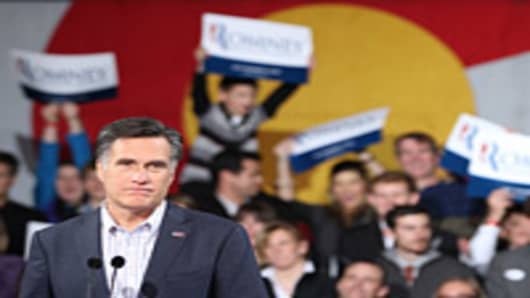Former Michigan Gov. Jennifer Granholm says Mitt Romney "stabbed us in the back" after the Republican presidential candidate restated his opposition the auto industry rescue package.
In an opinion piece in The Detroit News, Romney decried the bailout as "crony capitalism on a grand scale."
The article was published Tuesday, two weeks before the Feb. 28 Republican presidential primary in Michigan, where Romney was born.
A poll released Monday by Public Policy Polling showed former Pennsylvania Gov. Rick Santorum at 39 percent and Romney at 24 percent in the state.
The ex-Massachusetts governor and presumed front-runner to take on President Barack Obama is trying to make good in the eyes of prospective voters, Granholm and other Michigan Democratic leaders told reporters Tuesday during a conference call.
"He opposed the rescue package for the automakers," Granholm said. "Mitt Romney turned his back on Michigan. I would say he stabbed us in the back during our darkest hour and we're not going to forget."
Granholm was joined by U.S. Reps. John Dingell and Sander Levin, and Michigan Democratic Party Chair Mark Brewer.
Romney was born in Detroit and raised in the city and later in an upscale suburb. His father, George, was governor of the state and head of the now-defunct American Motors Corp. automaker there before making a failed run for the presidency in 1968.
In the article, Romney said that instead of the bailout he favored a "managed bankruptcy" for Chrysler and General Motors .
"It is a way for a troubled company to restructure itself rapidly, entering and leaving the courtroom sometimes in weeks or months instead of years, and then returning to profitable operation," he wrote.
Bankruptcy would have done away with accumulated labor, pension and other costs and "bungling management," allowing Chrysler and GM to remerge as competitive companies, he added.
"Ultimately, that is what happened," Romney wrote. "The course I recommended was eventually followed. But something else happened along the way that was truly egregious. Before the companies were allowed to enter and exit bankruptcy, the U.S. government swept in with an $85 billion sweetheart deal disguised as a rescue plan."
In a 2008 New York Times opinion article, he also called for a "managed bankruptcy." The article was titled: "Let Detroit Go Bankrupt."
"Gov. Romney is on the hook and he's trying to swim off it," Levin said. "There was no private money available. If there had been no injection of government funds ... his managed bankruptcy would have ended in liquidation. The president stood up. He had the guts to do that. The government had to supply the funds."
Romney also released a campaign ad Tuesday in which he drives a car through what appears to be a green, tree-lined middle class or above neighborhood. But part of the ad shows another street, gray and drab with homes decidedly less than middle class, and even one that is vacant.
"How in the world did an industry and its leaders and its unions get in such a fix that they lost jobs; that they lost their future?" Romney said in the 30-second spot. "People here in Detroit are distressed."
Levin said Michigan voters won't be fooled.
"(They) essentially want candidates to tell the truth," Levin said. "He can't change his stripes. People won't stand for that."



